(完整word版)仁爱英语七年级下册语法总结及练习题,推荐文档
仁爱英语七年级下册语法总结与练习题

仁爱英语七年级下册语法总结与练习题1.- How often does your sister surf the。
- About three times a day.2.- He is going there on July 28th.3.Thank you for helping me find my little cat yesterday.4.Are you good at swimming?5.- Could I use your computer。
- Sorry。
you can't.6.- How long does it take you to watch TV。
- About forty minutes.7.When it rains。
I take a taxi.8.- How long are you XXX。
- For two weeks.9.Does Barbara go to work by bus or on foot。
(删除有问题的段落)1.你的姐姐多久上一次网?- 大约每天三次。
2.他将在7月28日去那里。
3.感谢你昨天帮我找到小猫。
4.你游泳游得好吗?5.- 我能用你的电脑吗?- 对不起,你不能。
6.- 你看电视需要多长时间?- 大约40分钟。
7.下雨时,我会打出租车。
8.- 你在渥太华待多久?- 两周。
9.Barbara是坐公交车还是步行去上班?XXX.交通方式的表达:1.XXX to work by bus.XXX.2.XXX.How does your grandma often travel home?3.Miss Yang walks to work everyday.Miss Yang is XXX.4.XXX.XXX?现在进行时:I am currently watching TV now.XXX XXX.1.当一个动词以辅音字母结尾的重读闭音节时,双写最后一个字母再加-ing。
仁爱英语七年级(下册)语法总结与练习题
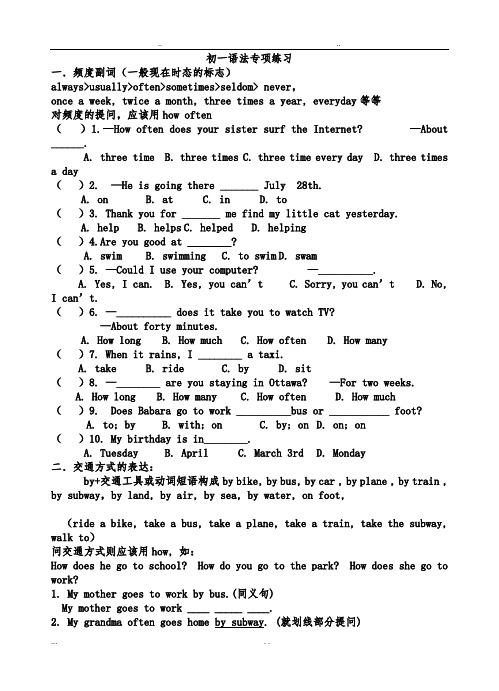
初一语法专项练习一.频度副词(一般现在时态的标志)always>usually>often>sometimes>seldom> never,once a week, twice a month, three times a year, everyday等等对频度的提问,应该用how often()1.—How often does your sister surf the Internet? —About ______.A. three timeB. three timesC. three time every dayD. three times a day()2. —He is going there _______ July 28th.A. onB. atC. inD. to()3. Thank you for _______ me find my little cat yesterday.A. helpB. helpsC. helpedD. helping()4.Are you good at ________?A. swimB. swimmingC. to swimD. swam()5. —Could I use your computer? —__________.A. Yes, I can.B. Yes, you can’tC. Sorry, you can’tD. No, I can’t.()6. —__________ does it take you to watch TV?—About forty minutes.A. How longB. How muchC. How oftenD. How many()7. When it rains, I ________ a taxi.A. takeB. rideC. byD. sit()8. —________ are you staying in Ottawa? —For two weeks.A. How longB. How manyC. How oftenD. How much()9. Does Babara go to work __________bus or ___________ foot?A. to; byB. with; onC. by; onD. on; on()10. My birthday is in________.A. TuesdayB. AprilC. March 3rdD. Monday二.交通方式的表达:by+交通工具或动词短语构成by bike, by bus, by car , by plane , by train , by subway,by land, by air, by sea, by water, on foot,(ride a bike, take a bus, take a plane, take a train, take the subway, walk to)问交通方式则应该用how, 如:How does he go to school? How do you go to the park? How does she go to work?1. My mother goes to work by bus.(同义句)My mother goes to work ____ _____ ____.2. My grandma often goes home by subway. (就划线部分提问)_______ does your grandma often ________ home?3.Miss Yang walks to work everyday . (改为同义句)Miss Yang goes to work ____ ____ everyday?4.My grandma usually takes the subway home. (就划线部分提问)your grandma go home?三、现在进行时:1. 定义:表示(说话瞬间)正在进行或发生的动作。
仁爱英语七年级下册重点语法知识归纳

七年级下期末考试复习一、名词的数可数名词的复数在名词后加“-s/-es”,不可数名词没有复数重点记忆:可数名词:bus-buses box-boxes knife-knives man-men woman-women snowman-snowmen baby-babies glass-glasses family-families tomato-tomatoes(马铃薯) foot-feet mouse-mice child-children shelf-shelvesactivity-activities country-countries mouse-mice wish-wishes leaf-leaves不可数名词:hair chicken rice bread water milk juice food homework work meat单复数都是同一个词(单复同形):Chinese Japanese people sheep(绵羊)一、冠词元音因素前用“an”,辅音因素前用“a”重点记忆:an apple an English teacher an office worker an American an “eleven”一个十一an eraser an egg an orange an ear an actor an office an order (一个命令) an email(一封邮件)冠词“the”是特指,写作时一般用于第二次出现的人和事物二、数词重点记忆:first second third fifth eighth ninth twelfth fifteenth fortieth三、动词1.动词的单三形式:一般加“-s/-es”, 部分双写最后一个字母,辅音+y结尾,要把“y”变成“i”,再加“es”,具体规则参考课本,下面列举出需要重点记忆的单词:do-does have-has teach-teaches go-goes catch-catches fly-flies try-tries study-studies watch-watchesstudy-studies wish-wishes2.动词的“-ing”形式,一般情况下在动词后加“-ing”,不发音的“e”结尾要去“e”后才加“-ing”,如:have-having live-living come-coming drive-driving make-making ride-riding use-using write-writing change-changing shine-shining prepare-preparing share-sharing arrive-arriving believe-believing 部分需双写最后一个字母后再加“-ing”,如:swim-swimming shop-shopping get-getting sit-sitting run-running3.动词的过去式,一般情况下加“-ed”,辅音加“y”结尾,先把“y”变成“i”再加“-ed”,部分要双写最后一个字母,部分是不规则变化,具体参考课本。
语法总结仁爱版英语七年级下册

)语法:(1)公式:主语+be(am,is,are)+v-ing+其他,否定:主语+be(am,is,are)+not+v-ing+其他(2)用法:现在或者现阶段正在进行的动作或者状态(3)规则变化:3+:直接+,去e+,双写+ ※特殊变化:lie-lying,die-dying(4)标志词:Look!Listen!now, at the moment(此时此刻)(5)特殊用法:现在进行表将来表示移动的瞬间动词的现在进行时可以表示将来含义:come, go, fly, move, leave, die等e.g:She is leaving for Shanghai.(1)公式:主语+v-ed(过去式)+其他,否定要借助动词did:主语+didn't+v-原+其他主语+was/were+其他,否定直接加not:主语+was/were+not+其他(2)用法:过去的动作或者状态(3)规则变化:4+(+ed):直接+,去e+,双写+,变y+(4)标志词:①yesterday②ago③last④过去时间短语※in the 1960s(世纪+1)译为二十世纪六十年代3.there be句型(有)(1)there be+某人/某物+方位介词+地点否定:there be+not+某人/某物+方位介词+地点疑问:Be+there+某人/某物+方位介词+地点?特殊疑问:What is 方位介词+地点?(2)句型:there be++方位介词+地点某处有某人/某物正在做某事there be+某人/某物+方位介词+地点某处有某人/某物被...e.g.:There are many old people living in our community. 有很多老人住在我们小区。
e.g.: There are many trees planted in our school.有很多树种在我们学校。
(3)就近原则:there be+某人/某物(主语)+方位介词+地点be动词的选择跟随主语走,多个主语时,根据离be动词近的主语决定。
(完整)仁爱版英语七年级下全部知识点总结,推荐文档

七年级下英语知识点总结Unit 5 Topic1㈠短语总结1.在学校大门口at the school gate2.来学校come to school3.去学校go to school4.上课have class / have classes5.步行on foot6.骑自行车ride a bike/ ride bikes/ by bike / ona bike7.坐公交by bus / take a bus8.坐地铁by subway / take the subway / onthe subway9.坐飞机by plane/ take the plane / on theplane10.坐小汽车by car / in a car/ take a car/ drive acar11.坐轮船by ship12.坐小船by boat13.坐火车by train / on the train14.在我们组in our group15.一群学生 a group of students16.我们中的三个人three of us17.在平日on weekdays18.在周末on the weekends / at weekends19.起床get up20.睡觉go to bed21.早起get up early22.回家go home23.到家get home24.去动物园go to the zoo25.去公园go to the park26.看电影see a movie / film27.看电视watch TV28.在晚上in the evening / at night29.帮助父母help parents30.做某人的家庭作业do one’s ( my/ her/ his/your/ their)homework31.在学校at school㈡重要句型1. I usually come to school by subway.同义句: I usually take the subway to school.对划线部分提问: How do you usually come to school? 32.知道,了解know about / learn about33.校园生活school life34.一个美国学生an American student35.在美国in America / in the U.S.A.36.许多学生many students/ a lot of students/ lotsof students37.很少very few38.吃午饭have lunch39.出去吃饭eat out40.在校期间on school days41.休息一会have a short rest/ break42.午饭后after lunch43.在某人的业余时间in one’s( my/ his/ her/their…)free/ spare time44.打篮球play basketball45.踢足球play soccer / football46.弹钢琴play the piano47.弹吉他play the guitar48.拉二胡play erhu49.去游泳go swimming / go for a swim50.去划船go boating51.球赛a ball game / ball games52.一年四次four times a year53.听音乐listen to music54.读书read books55.看报read newspapers56.看医生see a doctor57.去图书馆go to the library58.一周两次twice a week59.见朋友meet friends60.每天every day61.在七点半at half past seven62.一小会for a little while / for a short time63.晚饭后after supper64.吃饭have dinner65.吃早饭have breakfastgo to school by bike=go to schoolon a bike= ride a bike to school=ride to schoolgo home by bus=go home on a bus=take a bus home2.How do you usually/ often…?你通常/经常怎样…?3.It’s time for class.=It’s time to have class. =It’stime for having class.4.What about you? =How about you?5.How often …?询问频率,回答可以用频率副词:always, usually, often, sometimes, seldom, never, every day ,every +其他时间名词或表示频率的短语回答表示频率的短语:次数+单位时间e.g. : once a day / twice a week / three times a month6.The early bird catches the work. (谚语) 笨鸟先飞7.Work / Study must come first. 工作/ 学习必须放在第一位!8.Classes begin at eight. =Class begins at eight.提问:What time does the class begin? / What time do the classes begin?㈢重要单词的用法1. look (感官动词) 看起来,后面加形容词His mother looks very young.They look very cute.Her dress looks very nice.You look very cool in this coat.1.You new watch (look) very nice!2.Here (be) some news.3.Oh, come on! It’s time going to school.4.They usually go to school on (feet).5.In my class, forty of (we) go to schoolby bike. 2.by 介词by 后面直接加表示交通工具的名词,中间不用任何词修饰,如:by bikeby +动词ing 形式,表示通过某种方式People show love to their mothers by giving cards.You can be a good student by working hard. 3.over ( 形容词)School / Class is over.4.begin现在分词: beginning 过去式: beganbegin to do sth , begin doing sthHe begins to write a letter. =He begins writing a letter.如果begin 本身为分词,只能用begin to do sthHe is beginning to run.5.listen to 听(动作),hear 听见(结果)6.always 反义词never7.本话题涉及的时态为一般现在时,句中常有频率副词或表示频率的短语,如果主语为三单,动词一定要用三单!(四)易错题us.A. is alwaysB. seldom isC. always isD. often is19.The last class (finish) at twelve o’clock.20.Let’s go (boat).21.It’s time to have breakfast. (同义句)6.The early bird (catch) the worm.7.Kangkang often (ride) a bike to the park. .8.What time (be)school over? 22. Michael often rides a bike to school. (同义句)9.Work must come (once).10.It’s time you to get up.11.We often books in the morning..23. I always go to work on foot. (对划线部分提问)12.Jill’s friend like (study) in our school.13.Mr. Wang teaches (we) English. .of us like him.14.How about (go) out with me? 24.My mother goes shopping twice a week. ( 对划线部分提问)15.Most students go to school the school bus.16.do you go shopping with your mother?A. How soonB. How farC. How oftenD. How much.25.Mary always reads books in the library. (反义句)17.What time do you usually get up .weekdays?18.He busy, so he has no time to play with 26.He usually does his homework at school. (否定句).27.They often go to school by bus in the morning.(对划线部分提问)(一) 重要单词:Unit5 Topic2.28.Jane seldom watches TV on weekdays. (改为一般疑问句).29.He usually has lunch at home. (对划线部分提问).30.Li Ping often goes to work on foot. (同义句).31.几乎没有学生乘地铁去学校。
仁爱英语七年级下册全册知识点归纳测试试题及答案
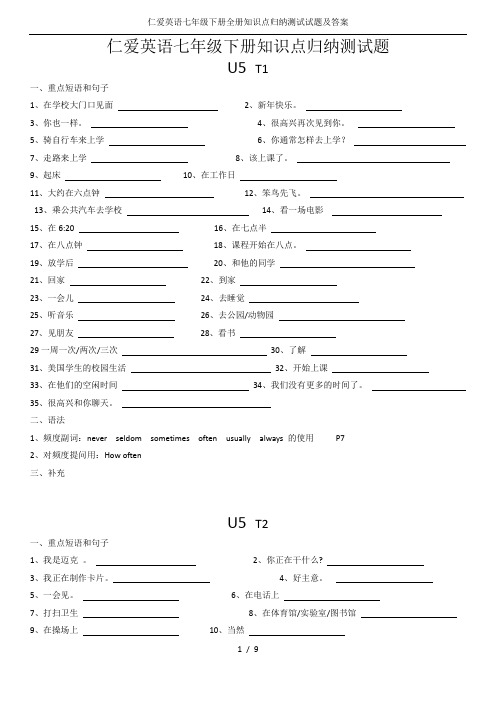
仁爱英语七年级下册知识点归纳测试题U5T1一、重点短语和句子1、在学校大门口见面2、新年快乐。
3、你也一样。
4、很高兴再次见到你。
5、骑自行车来上学6、你通常怎样去上学?7、走路来上学8、该上课了。
9、起床10、在工作日11、大约在六点钟12、笨鸟先飞。
13、乘公共汽车去学校14、看一场电影15、在6:20 16、在七点半17、在八点钟18、课程开始在八点。
19、放学后20、和他的同学21、回家22、到家23、一会儿24、去睡觉25、听音乐26、去公园/动物园27、见朋友28、看书29一周一次/两次/三次30、了解31、美国学生的校园生活32、开始上课33、在他们的空闲时间34、我们没有更多的时间了。
35、很高兴和你聊天。
二、语法1、频度副词:never seldom sometimes often usually always 的使用P72、对频度提问用:How often三、补充U5T2一、重点短语和句子1、我是迈克。
2、你正在干什么?3、我正在制作卡片。
4、好主意。
5、一会见。
6、在电话上7、打扫卫生8、在体育馆/实验室/图书馆9、在操场上10、当然11、我能借你的英语练习册吗?12、他从图书馆借了一些书。
13、我把我的自行车借给李军。
14、我能借他们多久呢?15、按时归还(return=give back)16、在失物招领处17、我正在寻找18、这有一个钱包。
19、带我参观20、几名学生21、举行一场足球比赛22、那边23、他正在写一封信。
24、在教室的后面25、画画26、写一封信27、听音乐28、在一台电脑上29、长城是伟大的。
30、有一天二、重点语法1、现在进行时的一般疑问句和回答,现在进行时的特殊疑问句。
P152、现在分词的构成规则P121三、补充U5T3一、重点短语和句子1、今天星期几?2、今天几号?3、在星期一/星期二……4、他们正在上什么课?5、他们正在上音乐课。
6、什么时间下课?7、下节课什么时候开始?8、我们能够互相帮助。
(完整版)仁爱英语七年级下册重要知识点和语法点归纳,推荐文档

Unit 5 Our School Lifetopic1How do you go to school?一、重点词语:1. wake up醒来,唤醒get up起床2. go to school去上学go home 回家3. go dancing / shopping / skating / swimming去跳舞;购物、滑冰;游泳go doing something可用于表达去进行某种娱乐休闲活动。
4.表示交通方式:on foot步行by boat坐船by ship坐船by air乘飞机by plane乘飞机by train坐火车by subway搭乘地铁by car坐小汽车by bus坐公共汽车by bike骑自行车5. take the subway / bus / car搭乘地铁;公共汽车;小汽车6. drive a car to work = go to work by car驾车去上班take a bus to work = go to work by bus乘公共汽车去上班go to school on foot = walk to school步行去上学7. ride a bike / horse骑自行车;骑马8. after school / class放学以后;下课以后9. play the piano / guitar / violin弹钢琴;吉他;小提琴play basketball / soccer / football打篮球;踢足球;打橄榄球play computer games玩电脑游戏play with a computer玩电脑play sports做运动10. next to紧挨着,在⋯旁边11. a plan of my school一幅我们学校的平面图12. on weekdays在工作日at weekends在周末13. have breakfast / lunch / supper / dinner / meals吃早餐;中餐;晚餐;正餐;一日三餐have classes / lessons / a meeting上课;上课;开会14. watch TV / movies / games / the animals看电视;电影;比赛;动物read novels / newspapers / books看小说;报纸;书15. wash one ’s face / clothes洗脸;衣服16. 反义词: up – down, early– late近义词:quickly– fastget up early早起be late for迟到17. the first / second / third / fourth day第一;二;三;四天18. clean the house打扫房子19.表示建筑物(尤其学校建筑物):on the playground在操场at school / home / table在学校;家里;桌旁in a computer room / teachers’ office / classroom building / gym / library / lab / canteen在电脑室;教师办公室;教学楼;体操馆;图书馆;实验室;食堂20. around six o’clock = at about six o’clock大约在六点21. 频率副词: never, seldom, sometimes, often, usually, always二、重点句型:1.It’s time to get up.该起床的时候了。
仁爱版本初中七年级的下册的英语总结复习学习资料.doc
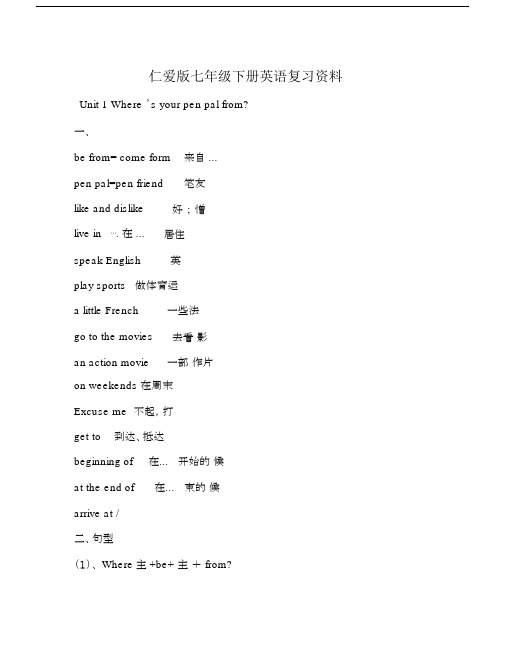
仁爱版七年级下册英语复习资料Unit 1 Where ’s your pen pal from?一、be from= come form 来自 ...pen pal=pen friend 笔友like and dislike 好;憎live in ⋯. 在 ... 居住speak English 英play sports 做体育运a little French 一些法go to the movies 去看影an action movie 一部作片on weekends 在周末Excuse me 不起,打get to到达、抵达beginning of在...开始的候at the end of在...束的候arrive at /二、句型(1)、 Where主 +be+ 主+ from?主+ be+from+地点 .(2)、W here do/does+ 主+ live?主+ live/lives in ⋯(3)、What language do/does + 主 +speak? 主+ speak/speaks ⋯.(4)、主+ like/likes+doing ⋯三、日常交用1-W here is your pen pal from?-He’s from China.2-W here does she live?- -She lives in Tokyo.3-Does she speak English?-Yes,she does/No,she dosen’t.4-Is that your new pen pal?-Yes,he is /No,he isn’t.5-What language does she speak?-S he speaks English.Unit 2 Where ’s the post office一、post office局pay phone 投式公用next to在...隔壁across from 在... 面in front of 在... 前面between⋯and⋯在... 和... 之on a street 在街上in the neighborhood 在附近on the right/left 在右/在左on one ’s right/left 在某人的右/左turn right/left 向右/左take a walk 散步have fun玩得开心the way to⋯去...的路take a taxi打的/乘出租go down(along) ⋯沿着 ... 走go through...穿..have a good trip旅途愉快二、句型(1)、Is there a bank near here?Yes,there is .It’s on Centre Street.No,there isn’t.(2) 、Where’s the sumpermarket?It ’s next to the library.(3)、Bridge Street is a good place to have fun.(4)、I hope you have a good trip.(5)、If you are hungry,you can buy food in the restaurant.(6)、Talk a walk though the park..(7)、enjoy 后接名或 -ing 形式 .Do you enoy(=like) your work?Do you enjoy(=like) living in the city?三、日常交用(1) 、Is there a⋯.?句型Eg:-Excuse me.Is there a hotel in the neighborhood.- Yes, there is. No.there isn’t(2) 、Where is⋯?句型Eg:-Where is the park,please?- It ’s behind the bank.( 肯定回答)- I ’m sorry I don ’t know. ( 否定回答)(3) 、Which is the way to +地点? 句型 . 例如:- Which is the way to the library.例如:(4) 、How can I get to +地点?句型.-How can I get to the restaurant?(5) 、Can you tell me the way to + 地点?句型. 例-Can you tell me the way to the post office?(6) 、Let me tell you the way to my house.(7) 、Just go straight and turn left.Unit 3 Why do you like koalas?一、want to do sth .想要做某事want sb to do sth想要某做某事want sth想要某物Let sb do sth某人做某事kind of有几分种a kind of 一种⋯⋯years old ⋯年如: ten years old 十like to do sth 喜做某事like doing sthplay with ⋯与... 一起玩be quiet 安静during the day 在白天at night 在夜have a look at.. 看...one⋯the other 一个 ... 另一个 ...二、句型(1)、-why do you like pandas?- Because they ’re very cure.(2)、-Why dose he like koalas?-Because they are kind of interesting.(3)、-Where are lions from?-Lions are from South Africa.(4)、-What animals do you like?-I like elephants.三、日常交际用语(1) 、- Let ’s see the lions.(2)-Why do you want to see the lions?-Becase they are very cute.(3)-Do you like giraffes?Yes,I do./ No,I don’t(4)-What other animal do you like?_I like dogs.tooother+名词的复数.表示没有特定的数量范围the other+名词的复数表示有特定的数量范围.(5)-Why are you looking at me?-Because you are very cute.(6)-Let us play games.–Great!Let me see.Unit 4 I want to be an actor.一、want to be+想要成。
仁爱版七年级下册英语重点知识点总结(短语、句型、语法)
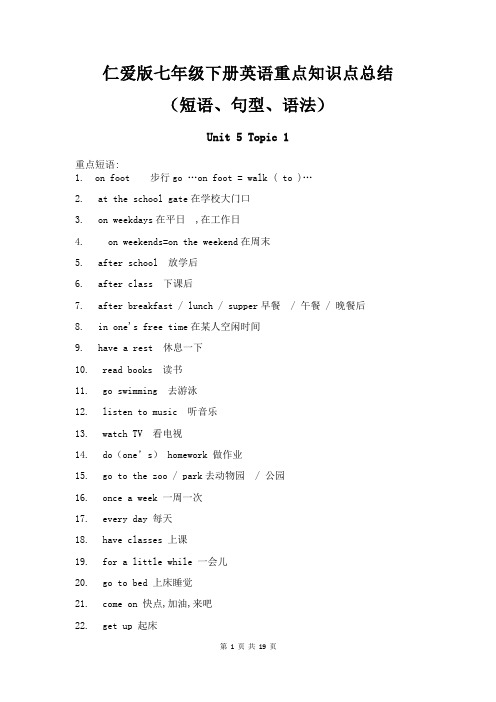
仁爱版七年级下册英语重点知识点总结(短语、句型、语法)Unit 5 Topic 1重点短语:1. on foot 步行go …on foot = walk ( to )…2.at the school gate在学校大门口3.on weekdays在平日,在工作日4.on weekends=on the weekend在周末5.after school 放学后6.after class 下课后7.after breakfast / lunch / supper早餐/ 午餐 / 晚餐后8.in one's free time在某人空闲时间9.have a rest 休息一下10.read books 读书11.go swimming 去游泳12.listen to music 听音乐13.watch TV 看电视14.do(one’s) homework 做作业15.go to the zoo / park去动物园/ 公园16.once a week 一周一次17.every day 每天18.have classes 上课19.for a little while 一会儿20.go to bed 上床睡觉e on 快点,加油,来吧22.get up 起床23.talk with / to s b.与某人谈话24.at school 在学校、在上课25.go to school 去上学26. and so on ……等等重点句型:1. --Happy New Year! --The same to you.2.--Your new bike looks very nice. --Thank you3.--How do you usually come to school? --I usually come to school by subway.4.--How often do you go to the library? --Once/Twice/Three timesa week/Very often/Every day/Seldom5.The early bird catches the worm.(谚语) 笨鸟先飞6.Work / Study must come first.工作/ 学习必须放在第一位!7.Classes begin at eight.=Class begins at eight.8.What time does the class begin?What time do the classes begin?9.We have no more time.我们没有更多的时间了。
(完整版)仁爱版英语七年级下册知识点归纳(完整版)
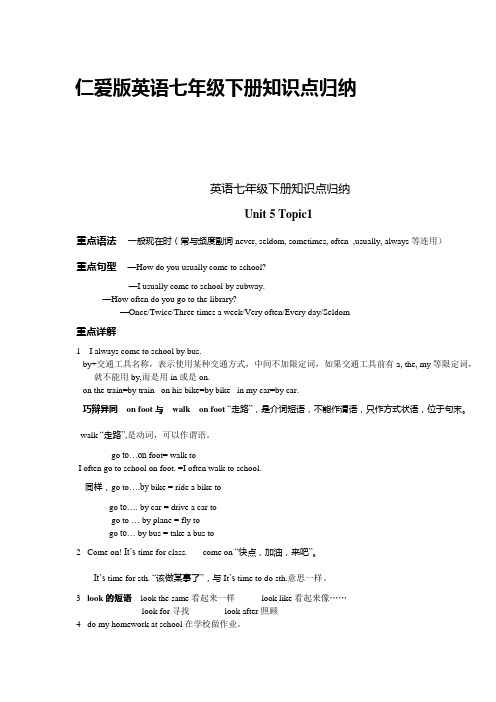
仁爱版英语七年级下册知识点归纳英语七年级下册知识点归纳Unit 5 Topic1重点语法一般现在时(常与频度副词never, seldom, sometimes, often ,usually, always等连用)重点句型—How do you usually come to school?—I usually come to school by subway.—How often do you go to the library?—Once/Twice/Three times a week/Very often/Every day/Seldom重点详解1I always come to school by bus.by+交通工具名称,表示使用某种交通方式,中间不加限定词,如果交通工具前有a, the, my 等限定词,就不能用by,而是用in或是on.on the train=by train on his bike=by bike in my car=by car.巧辩异同on foot 与walk on foot “走路”,是介词短语,不能作谓语,只作方式状语,位于句末。
walk “走路”,是动词,可以作谓语。
go to…on foot= walk toI often go to school on foot. =I often walk to school.同样,go to….by bike = ride a bike togo to…. by car = drive a car togo to … by plane = fly togo to… by bus = take a bus to2 Come on! It’s time for class. come on “快点,加油,来吧”。
It’s time for sth. “该做某事了”,与 It’s time to do sth.意思一样。
仁爱英语七年级下册语法总结及练习题【最新整理】
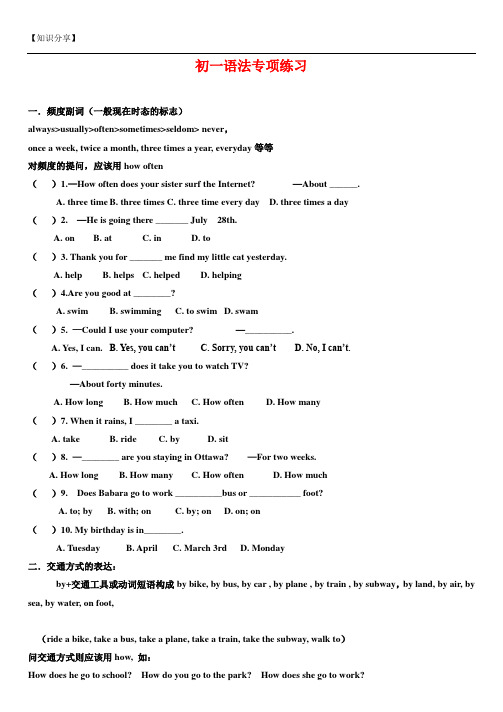
初一语法专项练习一.频度副词(一般现在时态的标志)always>usually>often>sometimes>seldom> never,once a week, twice a month, three times a year, everyday等等对频度的提问,应该用how often()1.—How often does your sister surf the Internet? —About ______.A. three timeB. three timesC. three time every dayD. three times a day()2. —He is going there _______ July 28th.A. onB. atC. inD. to()3. Thank you for _______ me find my little cat yesterday.A. helpB. helpsC. helpedD. helping()4.Are you good at ________?A. swimB. swimmingC. to swimD. swam()5. —Could I use your computer? —__________.A. Yes, I can.B. Yes, you can’tC. Sorry, you can’tD. No, I can’t.()6. —__________ does it take you to watch TV?—About forty minutes.A. How longB. How muchC. How oftenD. How many()7. When it rains, I ________ a taxi.A. takeB. rideC. byD. sit()8. —________ are you staying in Ottawa? —For two weeks.A. How longB. How manyC. How oftenD. How much()9. Does Babara go to work __________bus or ___________ foot?A. to; byB. with; onC. by; onD. on; on()10. My birthday is in________.A. TuesdayB. AprilC. March 3rdD. Monday二.交通方式的表达:by+交通工具或动词短语构成by bike, by bus, by car , by plane , by train , by subway,by land, by air, by sea, by water, on foot,(ride a bike, take a bus, take a plane, take a train, take the subway, walk to)问交通方式则应该用how, 如:How does he go to school? How do you go to the park? How does she go to work?1. My mother goes to work by bus.(同义句)My mother goes to work ____ _____ ____.2. My grandma often goes home by subway. (就划线部分提问)_______ does your grandma often ________ home?3.Miss Yang walks to work everyday . (改为同义句)Miss Yang goes to work ____ ____ everyday?4.My grandma usually takes the subway home. (就划线部分提问)your grandma go home?三、现在进行时:1. 定义:表示(说话瞬间)正在进行或发生的动作。
仁爱版英语七年级下册知识点复习归纳(完整版)

仁爱版英语七年级下册知识点归纳英语七年级下册知识点归纳Unit 5 Topic1重点语法一般现在时(常与频度副词never, seldom, sometimes, often ,usually, always等连用)重点句型—How do you usually come to school?—I usually come to school by subway.—How often do you go to the library?—Once/Twice/Three times a week/Very often/Every day/Seldom重点详解1I always come to school by bus.by+交通工具名称,表示使用某种交通方式,中间不加限定词,如果交通工具前有a, the, my 等限定词,就不能用by,而是用in或是on.on the train=by train on his bike=by bike in my car=by car.巧辩异同on foot 与walk on foot “走路”,是介词短语,不能作谓语,只作方式状语,位于句末。
walk “走路”,是动词,可以作谓语。
go to…on foot= walk toI often go to school on foot. =I often walk to school.同样,go to….by bike = ride a bike togo to…. by car = drive a car togo to … by plane = fly togo to… by bus = take a bus to2 Come on! It’s time for class. come on “快点,加油,来吧”。
It’s time for sth. “该做某事了”,与 It’s time to do sth.意思一样。
(完整版)仁爱版英语七年级(下册)语法知识总复习练习题(可编辑修改word版)
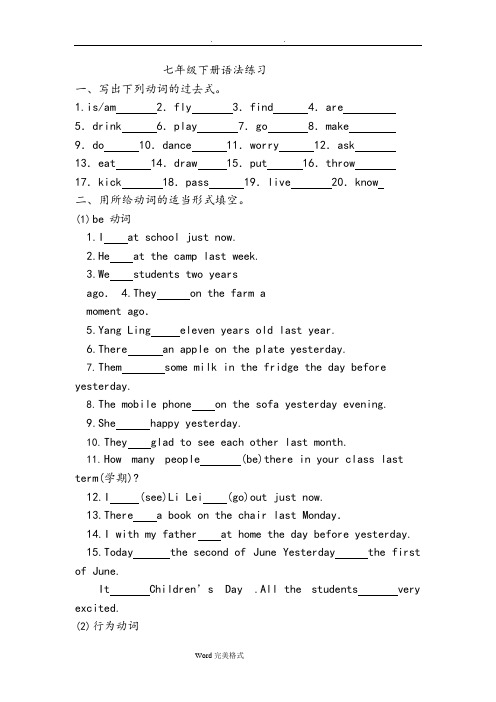
七年级下册语法练习一、写出下列动词的过去式。
1.is/am 2.fly 3.find 4.are5.drink 6.play 7.go 8.make9.do 10.dance 11.worry 12.ask13.eat 14.draw 15.put 16.throw17.kick 18.pass 19.live 20.know二、用所给动词的适当形式填空。
(1)be 动词1.I at school just now.2.He at the camp last week.3.We students two yearsago. 4.They on the farm amoment ago.5.Yang Ling eleven years old last year.6.There an apple on the plate yesterday.7.T hem some milk in the fridge the day before yesterday.8.T he mobile phone on the sofa yesterday evening.9.She happy yesterday.10.They glad to see each other last month.11.How many people (be)there in your class last term(学期)?12.I (see)Li Lei (go)out just now.13.There a book on the chair last Monday.14.I with my father at home the day before yesterday.15.Today the second of June Yesterday the first of June.It Children’s Day .All the students very excited.(2)行为动词1.L ucy (live)in Changchun two years ago.2.T he cat (eat)a mouse(老鼠)last night.3.We (have)a party last Christmas Day.4.Alice (pick)up oranges on the farm lastweek. 5.I (make)a model plane with Bob yesterday.6.They (play)chess in the classroom last RE lesson.7.My grandmother (cook)nice food last Spring Festival.8.T he girls (sing)and (dance)at the party last night.9.T om and Mary (come)to China last month.10.Mary (read)English yesterdaymorning. 11.I (call)Mike this morning.12.I listened but (hear)nothing.13.Tom (begin)to learn Chinese lastyear. 14.My mother (not do)houseworkyesterday.15.—What time you (get)to Beijing yesterday?一We (get) to Beijing at 9:00 in the evening.16.Did she (have)supper at home?17.Jack (not clean)the room just now.18.They all (go) to the mountains yesterday morning.19.—When you (come)to china?—Last year.20.—What Tom (do) last Saturday evening?—He (watch)TV and (read) an interesting book.21.Joy always (play) her toy in her room.22.Joy (play) her toy in her room now.23.He often (do) his homework in the evening , but now he (watch) TV now?24.The boy (play) basketball every afternoon.25.The boy is over there. They (play) basketball26.Lily (like) watching TV. She (watch) TVevery evening. But now she (not watch) TV. She (read) an English book.27.-Listen! Who (sing) in the next room?- I think it's Li Mei. She often (sing) in the next room. And she (sing) well.三、单项选择()1.She watered the flowers .A.tomorrow B .sometimes C. yesterday morning()2.What Peter do last Sunday?A. do B .does C .did()3.I my room lastweekend. A.cleaned B .cleanC. am cleaning()4.I often helped my mother housework last year.A. does B. did C .do()5. your brother TV last night?A.Do,watch B .Did,watch C. Did,watched()6.—Did your sister write an e—mail yesterday?—.A.Yes,she did B Yes,she does C No,she don’t ( )7.They on a trip in May,2009A.are going B going C.went( )8.We’re going to mountains tomorrow.A climbB climbed C.climbing( )9. Tom volleyball lthree days ago?A.Does,play B Did,played C Did,play( )10.一Good afternoon,Miss Zhang How does Alan feel?—He’s tired He a lot of work.A does, this morningB do, this morningC did, this morning四.用 be 动词填空:1.There a pen in my hand.2.There some juice in the glass.3.there a study on the second floor?4.There some books on the shelf.5.There 61 students in our class.6. there any apples in the kitchen?五.句型转换:1.There is a book on the desk.(改为否定句)a book on the desk.2.There is a cat behind the door.( 改为复数形式)There two behind the door.3.There is a cat behind the door. (改为一般疑问句)a cat behind the door?4.There is a picture on the wall.(否定句)5.There is a cat behind the door.(复数形式)6.There is a black car in front of his house.(一般疑问句)7.There is an old man in the room.(改为复数形式)There old in the room .8.There is some meat on the plane.(改为否定句)There on the plane9.There is a map of Beijing on the wall.(改为一般疑问句并做肯定回答)a map of Beijing on the wall?,.10.There are thirteen trees behind the house.(对画线部分提问)trees behind the house? 11.There’s an apple on the table.(对画线部分提问)on the table?12.There is only one T-shirt in the living room.(对划线部分提问)there in the living room?13.There are some computers in our school.(改为否定句)There computers in our school.参考答案一、 1.was 2. flew3.found4.were5.drank6.played7.went8.made9. did 10.danced 11.worried 12..asked 13.ate 14.drew 15.put 16.threw17. kicked 18.passed19.lived 20.knew二、(1)1.was 2.was3.were4.were5. was6.was7.was8.was9.was10. were11.were12.saw,go13.was1 4.was15.is,was,was,were(2)1.lived 2.ate3.had4.picked5.made6.played7.cooked8.sung,danced9.came 10.read 11.called 12.heard 13.began 14.didn’t do15.did,get,got 16.have17.didn’t clean18.went 19.did,come20.did,do,watched,read21.plays 22.is playing23.does,is watching24.plays 25. are playing26.likes ,watches, isn’t watching, is reading 27.is singing, sings, sings三、 1.C 2.C 3.A 4.C 5.B6.A 7.C 8.A 9.C 10.C四.1. is 2. is 3. Is 4. are 5.are 6.Are 五.1. There isn’t 2. are cats 3.Is there 4. There isn’t a picture on the wall5.There are cats behind the door6. Is there a black car in front of his house ?7.are two men 8.isn’t any meat9.Is there ,Yes, there is 10 How many are there11. What’s12.How many T-shirts are13.aren’t any。
(完整版)最新年仁爱英语七年级下册知识点总结打印版,推荐文档

on+大型封闭式工具 take the+交通工具by +交通工具 on foot 与 walk重点短语七年级下册知识点总结Unit 5 Topic 11. on foot go …on foot = walk ( to)…2. at the school gate 在学校大门口3. on weekdays 在平日 ,在工作日4. on weekends=on the weekend 在周末5. after school 放学后6. after class 下课后7. after breakfast / lunch / supper早餐 / 午餐 / 晚餐后8. in ones free time 在某人空闲时间 9. have a rest 休息一下 10. read books 读 书 11. go swimming 去游泳12. listen to music 听音乐重点句型1. Happy New Year! The same to you.2. Your new bike looks very nice . Thank you. 13. watch TV 看电视14. do (one’s ) homework 做作业15. go to the zoo / park 去动物园 / 公园 16. once a week 一周一次 17. every day 每 天 18. have classes 上 课19. for a little while 一会儿 20. go to bed 上床睡觉 21. come on 快点,加油,来吧 22. get up 起 床23. talk with / to sb.与某人谈话 24. at school 在学校、在上课 25. go to school 去上学 26. and so on ……等等3. How do you usually come t o school? —I usually come to school by subway.4. How often do you go to the library?5. —Once/Twice/Three times a week/Very often/Every day/Sedom6. The early bird catches the work. (谚语) 笨鸟先飞7. Work / Study must come first. 工作/ 学习必须放在第一位! 8. Classes begin at eight. =Class begins at eight.9. What time does the class begin? / What time do the classes b egin? 10. We have no more time. 我们没有更多的时间了。
(完整word)(仁爱版)英语七年级下册知识点归纳与总结,推荐文档
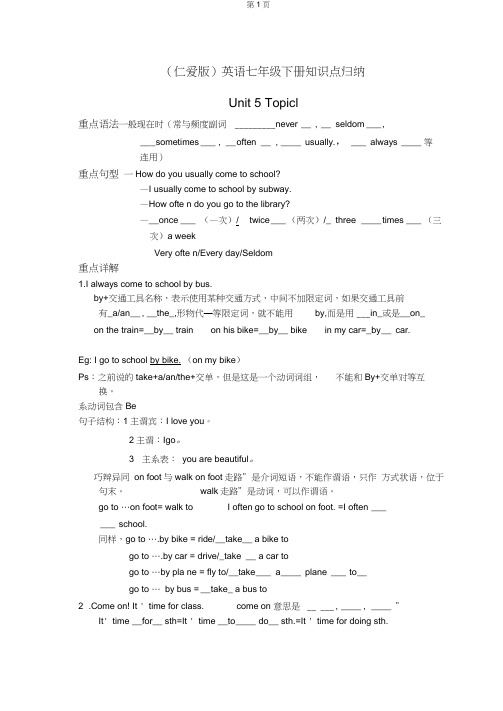
第1页(仁爱版)英语七年级下册知识点归纳Unit 5 Topicl重点语法一般现在时(常与频度副词 _________ n ever __ , __ seldom ___ ,___ s ometimes ___ , __ o ften __ , ____ usually., ___ always ____ 等连用)重点句型一How do you usually come to school?—I usually come to school by subway.—How ofte n do you go to the library?—__once ___ (—次)/ twice ___ (两次)/ _three ____ times ___ (三次)a weekVery ofte n/Every day/Seldom重点详解1.I always come to school by bus.by+交通工具名称,表示使用某种交通方式,中间不加限定词,如果交通工具前有_a/an __ , __the_,形物代—等限定词,就不能用by,而是用___ i n_或是__on_ on the train=__by__ train on his bike=__by__ bike in my car=_by __ car.Eg: I go to school by bike. (on my bike)Ps:之前说的take+a/an/the+交单,但是这是一个动词词组,不能和By+交单对等互换。
系动词包含Be句子结构:1主谓宾:I love you。
2主谓:Igo。
3 主系表:you are beautiful。
巧辩异同on foot与walk on foot走路”是介词短语,不能作谓语,只作方式状语,位于句末。
walk走路”是动词,可以作谓语。
go to …on foot= walk to I often go to school on foot. =I often ______ school.同样,go to ….by bike = ride/__take__ a bike togo to ….by car = drive/_take __ a car togo to …by pla ne = fly to/__take ___ a ____ plane ___ to__go to … by bus = __ t ake_ a bus to2 .Come on! It ' time for class. come on 意思是__ ___ , ____ , ____ ”It' time __for__ sth=It ' time __to ____ do__ sth.=It ' time for doing sth.It' time for dinner= It 'time to eat dinner= It' time for eat ing dinner.3 .look 的短语look __the _____ same_看起来一样look __like_看起来像.....look __for__ 寻找look __after__ 照顾4 .do my homework at school 在学校做作业do one 's homework 做家庭作业(注意:one's 要随主语的变化而变化,常用形容词性物主代词__my__, __your__, __his__ ,__her__, _its___, __our__ ,__your__,their 等)。
(完整版)仁爱版英语七年级下册单元语法
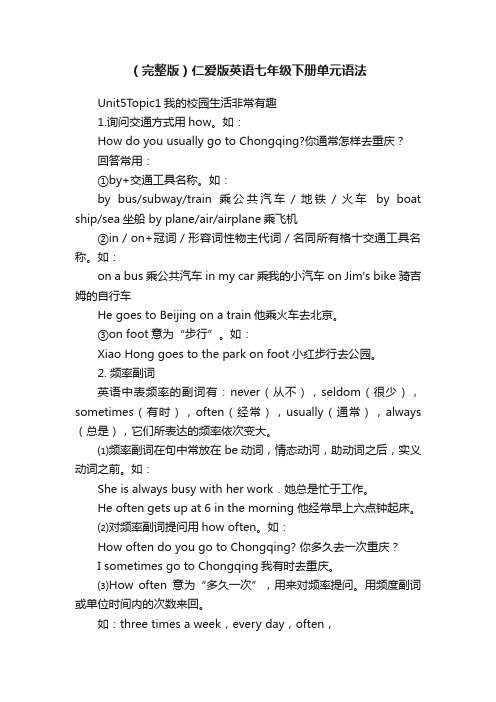
(完整版)仁爱版英语七年级下册单元语法Unit5Topic1我的校园生活非常有趣1.询问交通方式用how。
如:How do you usually go to Chongqing?你通常怎样去重庆?回答常用:①by+交通工具名称。
如:by bus/subway/train乘公共汽车/地铁/火车by boat ship/sea坐船 by plane/air/airplane乘飞机②in/on+冠词/形容词性物主代词/名同所有格十交通工具名称。
如:on a bus乘公共汽车 in my car乘我的小汽车 on Jim's bike骑吉姆的自行车He goes to Beijing on a train他乘火车去北京。
③on foot意为“步行”。
如:Xiao Hong goes to the park on foot小红步行去公园。
2. 频率副词英语中表频率的副词有:never(从不),seldom(很少),sometimes(有时),often(经常),usually(通常),always (总是),它们所表达的频率依次变大。
⑴频率副词在句中常放在be动词,情态动诃,助动词之后,实义动词之前。
如:She is always busy with her work.她总是忙于工作。
He often gets up at 6 in the morning 他经常早上六点钟起床。
⑵对频率副词提问用how often。
如:How often do you go to Chongqing? 你多久去一次重庆?I sometimes go to Chongqing我有时去重庆。
⑶How often意为“多久一次”,用来对频率提问。
用频度副词或单位时间内的次数来回。
如:three times a week,every day,often,seldom,always,never,sometimes,usually,every four weeks等。
- 1、下载文档前请自行甄别文档内容的完整性,平台不提供额外的编辑、内容补充、找答案等附加服务。
- 2、"仅部分预览"的文档,不可在线预览部分如存在完整性等问题,可反馈申请退款(可完整预览的文档不适用该条件!)。
- 3、如文档侵犯您的权益,请联系客服反馈,我们会尽快为您处理(人工客服工作时间:9:00-18:30)。
初一语法专项练习一.频度副词(一般现在时态的标志)always>usually>often>sometimes>seldom> never,once a week, twice a month, three times a year, everyday等等对频度的提问,应该用how often()1.—How often does your sister surf the Internet? —About ______.A. three timeB. three timesC. three time every dayD. three times a day()2. —He is going there _______ July 28th.A. onB. atC. inD. to()3. Thank you for _______ me find my little cat yesterday.A. helpB. helpsC. helpedD. helping()4.Are you good at ________?A. swimB. swimmingC. to swimD. swam()5. —Could I use your computer? —__________.A. Yes, I can.B. Yes, you can’tC. Sorry, you can’tD. No, I can’t.()6. —__________ does it take you to watch TV?—About forty minutes.A. How longB. How muchC. How oftenD. How many()7. When it rains, I ________ a taxi.A. takeB. rideC. byD. sit()8. —________ are you staying in Ottawa? —For two weeks.A. How longB. How manyC. How oftenD. How much()9. Does Babara go to work __________bus or ___________ foot?A. to; byB. with; onC. by; onD. on; on()10. My birthday is in________.A. TuesdayB. AprilC. March 3rdD. Monday二.交通方式的表达:by+交通工具或动词短语构成by bike, by bus, by car , by plane , by train , by subway,by land, by air, by sea, by water, on foot,(ride a bike, take a bus, take a plane, take a train, take the subway, walk to)问交通方式则应该用how, 如:How does he go to school? How do you go to the park? How does she go to work?1. My mother goes to work by bus.(同义句)My mother goes to work ____ _____ ____.2. My grandma often goes home by subway. (就划线部分提问)_______ does your grandma often ________ home?3.Miss Yang walks to work everyday . (改为同义句)Miss Yang goes to work ____ ____ everyday?4.My grandma usually takes the subway home. (就划线部分提问)your grandma go home?三、现在进行时:1. 定义:表示(说话瞬间)正在进行或发生的动作。
经常与now, at the moment, look, listen等词连用。
2. 基本结构:be (am/ is/ are)+v-ing(动词的现在分词)I’m watching TV now.3. 现在分词的构成:(1)一般情况下在动词词尾加ing。
go→going ask →asking look→looking(2)以不发音的e结尾的动词,去掉e加ing。
have →having take→taking make→making write→writing(3)以一个辅音字母结尾的重读闭音节,双写最后一个字母,再加-ing。
get→getti ng swim→swimming begin→beginning shop→shopping 4. 现在进行时态的肯定式、否定式、疑问式及简略回答。
(1)肯定式:be+v-ing She is singing in the next room.(2)否定式:be+not+v-ing The students aren’t cleaning the room.(3)一般问句:be动词提前。
肯定答语Yes,主语+be,否定答语No,主语+be not。
5.特殊疑问问句:疑问词+be +主语+doing+其他?(疑问词+一般疑问句)Ⅰ. 写出下列动词的ing形式1. clean_______2. read_________3. play________4. have_______5. get________6. eat_________7. take________8. make_______9. look_________ 10.watch______Ⅱ.句型转换1.Amy is playing computer games. (一般疑问句,肯定回答)________________________________________________________________2.They are doing their homework.(一般疑问句否定句)__________________________________________________________________________________________________3. The students are cleaning the classroom . (一般疑问句,否定回答)_______________________________________ __________________4. I’m playing football on the playground .(画线提问)___________________________________________________5. Tom is reading books in his study . (画线提问)___________________________________________________四.现在进行时与一般现在时的区别:(一)一般现在时定义:表示经常性的动作。
经常与频率副词(时间状语)连用:often经常, usually 通常, always总是,every每个, sometimes有时,at…在几点钟等。
只有第三人称单数用动词三单形式,其余动词均用原形。
(二)现在进行时1. 定义:表示(说话瞬间)正在进行或发生的动作,。
经常与now, at the moment, look, listen等词连用。
1.现在进行时表示动作的暂时性,而一般现在时表示动作的习惯性和经常性I am watching TV now. (暂时性)I watch TV every day. (经常性)2.现在进行时可表示短暂性动作,而一般现在时表示长久性动作。
Lucy is living in Beijing.(短时间居住)Lucy lives in Beijing.(长久性居住)Ⅰ.用动词的适当形式填空。
1. We often______(play) in the playground.2. He _____(get) up at six o’clock.3. ----Who_______(sing)a song? ----Li Ying is.5. Danny _____(study) English, Chinese, math, science and art at school.6. Mike sometimes ________(go) to the park with his sister.7. ________ Mike________(read) English every day?8. Look,the boy__________(run)fast.9. ----What are you doing? ----I_________(do) my homework.10. Look!The boy over there_______(play) a model plane.五、there be 句型1、定义:There be句型表示某处存在某物或某人。
2、结构:(1) There is +单数可数名词/不可数名词+ 地点状语.(2) There are +复数名词+地点状语.注意事项:there是引导词,在句中不充当任何成分,翻译时也不必译出。
句子的主语是某人或某物,谓语动词be要与主语(某人或某物)的数保持一致。
当主语是两个或两个以上的名词时,谓语动词要与跟它最近的那个名词一致。
如:There is a teacher and many students in our classroom.我们教室里有一位老师和许多学生。
There are many students and a teacher in our classroom.树下有两个男孩,一个女孩。
there be 句型的常考点考点一:各种句型转化。
1:变成否定There be句型的否定式的构成和含有be动词的其它句型一样,在be后加上not或no即可。
注意not和no的不同:not是副词,no为形容词,not a/an/any + n. 相当于no+ n.。
例如:There is a bike behind the tree. → There isn't a bike behind the tree. =There is no bike behind the tree.2:变成一般疑问句There be句型的一般疑问句变化是把be动词调整到句首,再在句尾加上问号即可。
